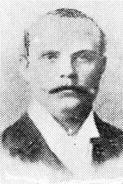 It weighs as much as a small baby, but I was pleased when the updated edition of “The Springbok Captains” arrived on my doorstep last week.
It weighs as much as a small baby, but I was pleased when the updated edition of “The Springbok Captains” arrived on my doorstep last week.
I read the first one around 10 years ago and it told the tale of South African rugby’s captains, beginning with law student HH Castens in 1881. The nature of South African rugby, with its mysteries and machinations, ensured that it was a gripping read.
Happily, local writer Stephen Nell continued the work of original author Edward Griffiths by bringing it up to speed with Jean de Villiers’ forced retirement dutifully recorded at the conclusion. We thus get to read of the more recent turns players like Fourie du Preez, Schalk Burger and even Johan Muller – remember him? – had leading their country.
Being Springbok captain has hardly ever been only about rugby. The job demands an equal measure of political smarts, diplomacy, thick skin and bloody-mindedness; qualities all 51 of these extraordinary men have possessed.
Fortunately the writers stayed away from making this a narrative about Test matches. Context is everything and the storylines are remarkable with almost every one cloaked in the currency of SA rugby with its controversies and capacity for undermining its own. Politics, whether shaped by the Broederbond or the ANC, has never been far from the job. Rugby politics, too, plays its part and is no less dirty or devious than the traditional kind.
Our captains have had to be relentlessly smart and shrewd. Each of them was strong of will and decent and dignified. Indeed, only special men are able to carry the enormous weight of the job.
Soon enough we will likely herald in a new man with the captain’s arm band. South African rugby is in one of its revolutionary moods. Coach Heyneke Meyer’s future will be determined in coming days. If he stays, he needs a new captain anyway. If someone else takes the poisoned chalice, and this is how the wind is blowing, he will appoint a captain of his choosing, probably someone young and dynamic.
The change in the air also demands a fresh look at the way the game is played. Here, too, “The Springbok Captains” provides a prescient quote on the subject.
“Manne, it is goodbye to dullness and safety-first methods. Our aim on this tour is to rid our game of the cloak of dullness it has worn for so long,” says one.
Du Preez? Burger? Smit?
No. It was Phillip Nel in 1937, emphatically proving that South African rugby has always struggled to evolve.
The role of coaches, some of whom were Machiavellian in thought and deed, gets well-referenced throughout the 600-plus pages. It makes for compelling reading.
There’s some nice stuff included around Nick Mallett and Joost van der Westhuizen, rugby men were cut from separate cloths entirely. Mallett, a soutie of the highest order was nothing if not intuitive.
He named the scrumhalf captain for the 1999 Rugby World Cup, notwithstanding the player being injured.
He insisted it was the right decision. “He is one of the bravest people I have ever known,” said the outspoken coach.
He was right. The great player is now battling severe illness and demonstrates his incredible bravery every day.
♦ The Springbok Captains is published by Jonathan Ball and is available at book stores for R250.

